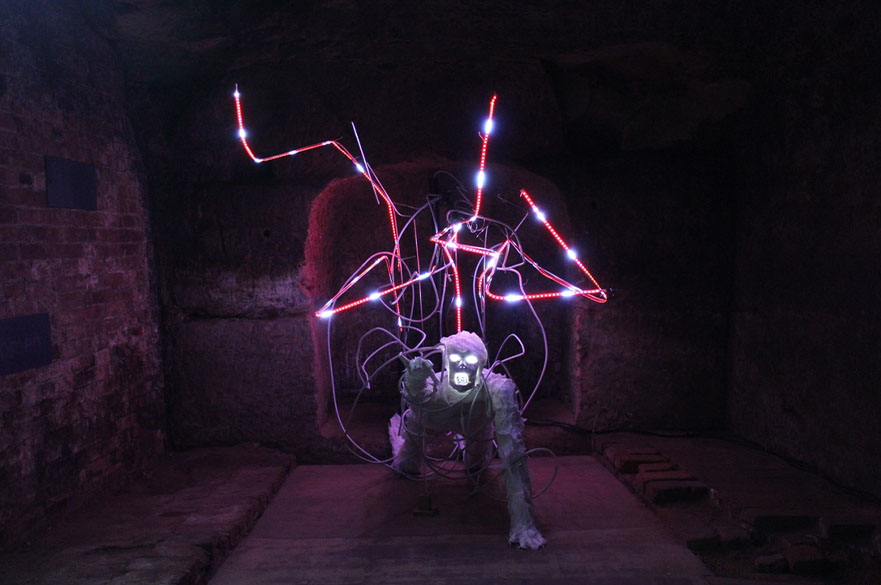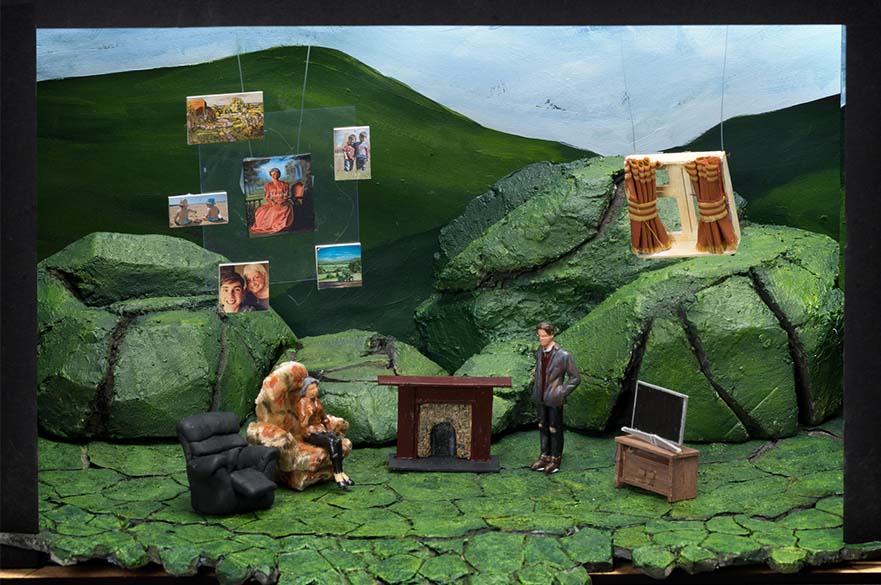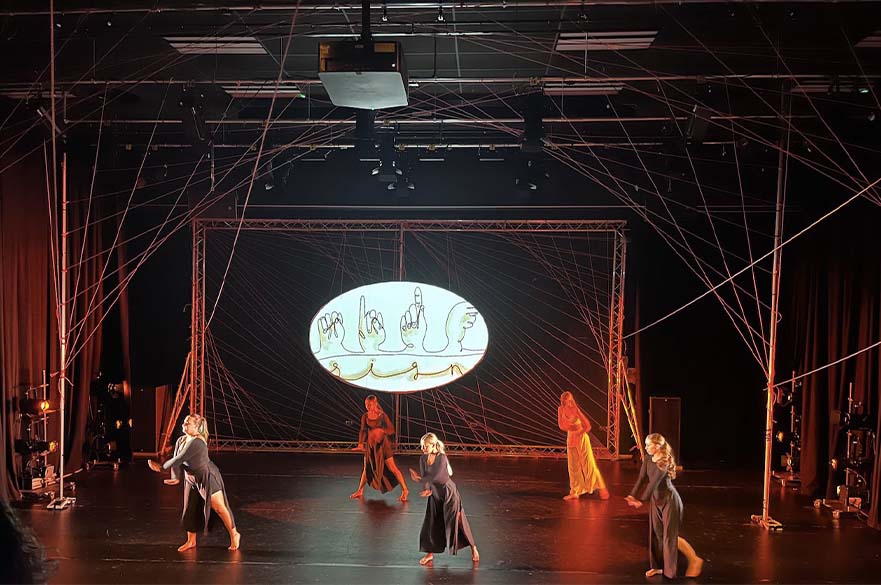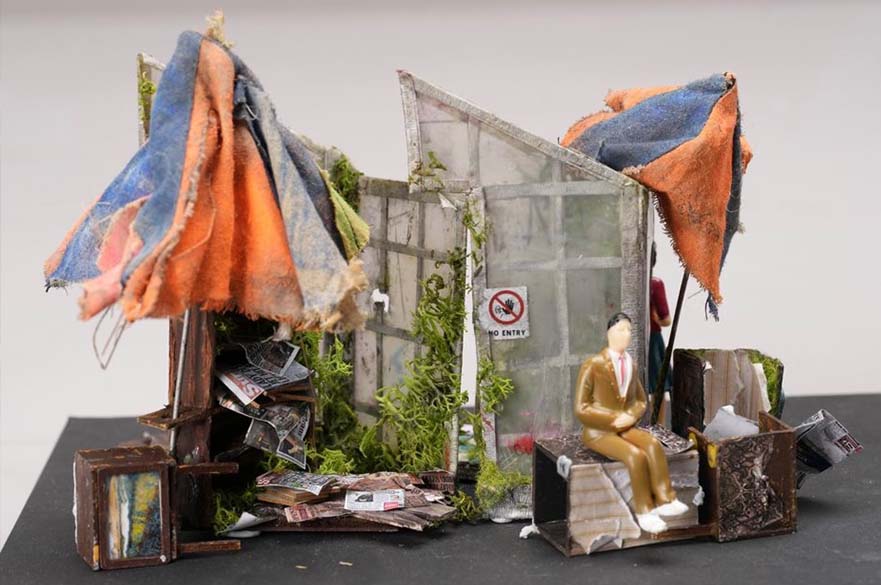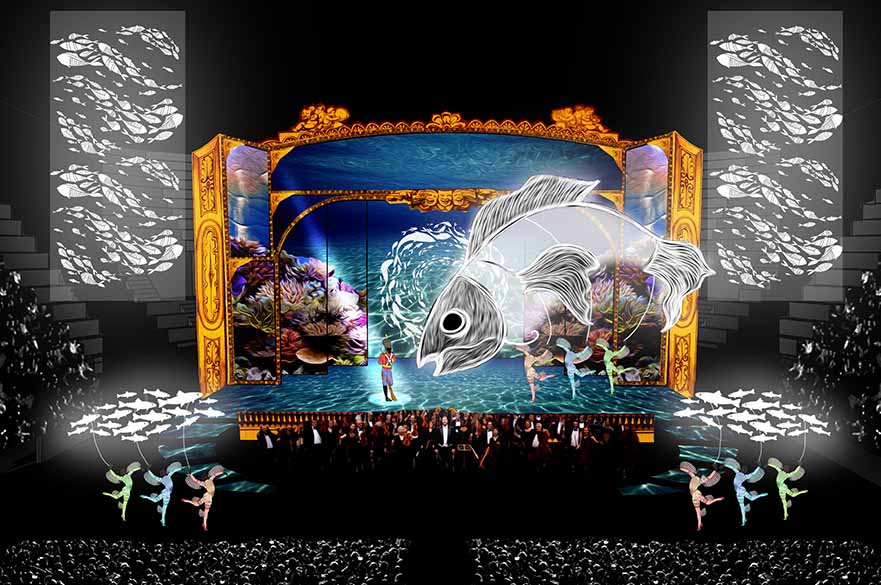20
Design for Theatre and Live Performance BA (Hons)
- Level(s) of Study: Undergraduate
- Typical Offer: 104 - 112 UCAS tariff points
- UCAS Code(s): W460
- Start Date(s): September 2024
- Duration: 3 / 4 year(s)
- Study Mode(s): Full-time / Sandwich
- Campus: City Campus
Introduction:
Explore all aspects of contemporary design practice for theatre and the live performance, including set and costume design; construction; digital technologies and design; lighting design and audio visual; site-specific design; puppetry; heritage installation; and design for community and education. The course is facilitated by the highly skilled team of staff and technicians who have years of professional and academic knowledge.
-
You’ll have the opportunity to complete a work experience placement of up to a year in length. Dependent on the duration of your placement, you could gain an additional Diploma or Certificate in Professional Practice.
-
This course is a member of the Performance Design Education Collective (PDEC), and the Society of British Theatre Designers (SBTD). Through these, we are also a member of the International Organisation of Scenographers, Theatre Architects and Technicians (OISTAT).
-
Work on live projects with industry such as The National Theatre, Delfont Mackintosh, The National Trust and Nottingham Playhouse. You can also enter competitions set by organisations such as The National Theatre’s Connections festival, and the Linbury Prize.
-
Go on study visits for inspiration, research, and experience, including live performances, museums and heritage and educational organisations. You can also apply for a European or international exchange to one of our partner institutions, such as Ryerson University in Canada.
What you’ll study
Throughout your degree, you’ll learn how to develop your creative, technical, communicative, collaborative and organisational skills. We have strong links with performance, heritage, educational and arts organisations, and professional theatre companies, who we regularly collaborate with.
Design for Stage and Screen: Introduction
(80 credit points)
Through independent and collaborative projects and practical workshops, you will develop the skills and vocabulary relevant to design for theatre and live performance. Through experimentation with a variety of methods and materials, this module will provide the opportunity to develop your visual communication skills and 3D problem solving, as you work on individual briefs, and a collaborative project with your fellow Design for Stage and Screen students.
You’ll develop your skills in model making, software packages such as ACAD, Photoshop and SketchUp, live practice work through puppetry, lighting, AV and scenic construction skills.
Contextual Studies: Introducing Research
(20 credit points)
Explore stage and screen history, cultural and contextual knowledge and its relevance to theatre and live performance. You will develop a critical knowledge and understanding of the role that performance, culture, art and design can play within society by examining cultural contexts across a variety of time periods and locations, aiding and enriching your practical work.
Skills Passport
(20 credit points)
This module introduces a variety of practical technical skills and the concepts of safe professional practice. Through exploration of a range of materials and processes, you will build relevant skills and develop your practical knowledge base, while allowing flexibility for personal direction and acquiring an understanding of industry needs.
Exploration (Design for Theatre and Live Performance)
(60 credit points)
Building on the knowledge and skills you acquired in Year One, you will develop and enhance your creative thinking and technical, visualisation and software skills, giving you a sound and relevant preparation for your final year and your future career.
You’ll work on briefs that further develop your dramaturgical, interpretive, conceptual and visual communication performance practice that takes you beyond the proscenium stage. Craft-based projects will extend and underpin your skills as a designer in areas such as scale-model making, lighting, projection, sound and scenic construction. Performance projects will increase your understanding and your ability to communicate a visual narrative.
Contextual Studies: Research and Impact
(20 credit points)
You will further investigate the role of performance and how it can convey meaning within a variety of cultural contexts, with an emphasis on performance analysis and practice within the global industry. You will continue to develop your intellectual curiosity and critical thinking skills which are key to the expression of your knowledge and understanding.
CoLab: Research, Exploration and Risk-taking
(20 credit points)
Through active participation with team-based problem-solving, you will work together in mixed teams on a project where you will use your creative ideas to generate solutions to the challenge or brief. Your project will allow you to explore how creativity can make an impact in society, as you choose a theme of sustainability, social justice, enterprise and innovation or community. This collaborative learning experience will expose you to a range of new processes and approaches that will develop your creative thinking.
Optional module
You will also choose one 20-credit module from:
- 3D Materials and Exploration
- Storyboarding
- Millinery : Object and Narrative
- Model Making: Object and Narrative
- Character Ideation
- Ethical Design (online and in person)
- Performance for Motion Capture
- Creative Live Event Production
Optional Placement Year (Sandwich)*
We have an option for all of our students to undertake a placement year (Sandwich) and allow you to decide whether this is right for you once you have completed years 1 and 2 of your course. This time spent working in industry provides our students with crucial work experience, which is highly prized and much sought after by employers upon graduation. If you are successful in securing a placement you will have the chance to gain an additional Certificate or Diploma in Professional Practice, dependent on duration.
* If you choose to take the sandwich route option, you will still need to apply for this course with the full-time UCAS code: W460
Exposition (Design for Theatre and Live Performance)
(100 credit points)
Work as a practising designer alongside industry professionals from our associate companies, and develop a design project for a specific client or audience, either individually or collaboratively, gaining an understanding of the process of initiating, developing, managing and realising a complex project. You will also develop your professional design portfolio and work on your reflective analysis of each project, developing your skills and preparing you for an exciting career in industry.
Contextual Studies: Research and Professional Practice
(20 credit points)
Undertake a detailed piece of written work that explores either an industry-related investigation of an area of theatre and live performance that is of significance to you. You will hone your research and critical analysis skills as you connect theory to relevant aspects of professional contemporary performance or practice.
Don’t just take our word for it, hear from our students themselves
Student Work
Video Gallery
How you’re taught
On this course, you will spend your time in creative studio environments. Teaching and learning experiences will include:
- studio days
- presentations
- independent projects
- demonstrations
- research
- reflective journals
- lectures
- seminars
- tutorials
- study visits.
Co Lab
Want real-world experience alongside your degree? Co Lab is your opportunity to work with peers from different disciplines on live projects set by industry partners. Embrace collaborative practice as you explore how creativity can make an impact in society and develop the skills employers want to see in the creative industries.
Exchange opportunities
If you’re thinking about studying part of your degree abroad, the course has exchange agreements with a number of institutions around the world.
Exchanges take place in Year Two of the course. You’ll receive guidance from the University about where you can study, and help in completing your application and arranging your exchange.
Showcase
You will be given the opportunity to exhibit your work during your time at NTU to members of the creative industries at the Graduate Student Showcase Festival in Nottingham and London-based theatres. Visit our ‘We Are Creatives’ showcase to take a look at the work of this year's graduating students’.
Contact hours
- Year 1 lectures/seminars/workshops (28%), independent study (72%).
- Year 2 lectures/seminars/workshops (22%), independent study (78%).
- Year 3 lectures/seminars/workshops (20%), independent study (80%).
Further information
- All first-year students within the Nottingham School of Art and Design will work together on a joint project.
- NTU is in the UK’s Top 15 for Art & Design in the Complete University Guide 2023 (Ranked 15th).
How you’re assessed
Further information
- All first-year students within the Nottingham School of Art and Design will work together on a joint project.
- NTU is in the UK’s Top 15 for Art & Design in the Complete University Guide 2023 (Ranked 15th).
Assessment is 100% through coursework. You’ll receive feedback throughout each module and will have opportunities to discuss feedback, identify areas of strength and weakness, and set personal goals. Depending on the module, you may be assessed through speculative design and live performances, artefacts, as well as presentations, written work and peer assessment.
- Year 1 coursework (100%).
- Year 2 coursework (100%).
- Year 3 coursework (100%).
People excel in different ways, and we want everybody to have the best possible chance of success. On this course you will be assessed on a range of individual and group presentations, and your final year project. Your work in Year Two accounts for 20% of your final degree mark, and your work in your final year accounts for the other 80%
Careers and employability
Graduates have been employed as designers and assistant designers on a multitude of live productions or have gained employment in specific production roles with companies such as:
- the English National Opera (drawing room)
- National Theatre (scenic art)
- Cameron Mackintosh (model-making).
Graduates have also freelanced alongside internationally renowned designers in and out of the UK and worked on gallery installations, festivals, in film and TV, and for events and as community artists and practitioners.
Connecting with industry
Recent live projects and collaborations have included:
- Royal Concert Hall, Nottingham
- Nottingham Playhouse
- Delfont Mackintosh
- Nottingham Puppet Festival
- City Arts Nottingham
- The Workhouse, Southwell (National Trust)
- Lakeside Arts Theatre
- Metronome
- TV Workshop
Industry experts who have recently shared their knowledge and experience with our students include:
- Luke Halls, award winning video and projection designer
- Neil Franklin, creative producer from Stage One
- Chris Boon, technical director, Delfont Mackintosh
- International Opera Designer - Leslie Travers
- Eco - scenographer- Andrea Carr
Creative Industries Federation
We are members of the Creative Industries Federation (CIF), which means students in the Nottingham School of Art & Design have the opportunity to sign up to free student membership. Creative Industries Federation are an organisation that represents, champions and supports the UK’s creative industries and membership grants students exclusive access to their selection of resources and events to help advance your career and connect with industry.
Campus and facilities
You’ll be based in the Waverley building – a beautifully restored listed building with real design heritage: it was the original home of the Nottingham School of Art. View our Nottingham School of Art & Design Facilities Hub here. You will study in dedicated facilities, including a studio theatre, construction and paint workshops, and large teaching spaces. Our facilities promote collaboration and innovation. You’ll be working alongside artists, designers, photographers, illustrators, animators, and filmmakers.
Entry requirements
BA (Hons) Design for Theatre and Live Performance
- Standard offer: 112 UCAS Tariff points from up to four qualifications
- Contextual offer: 104 UCAS Tariff points from up to four qualifications
Other requirements
Contextual offers
A lower offer may be made based on a range of factors, including your background (such as where you live and the school or college you attended), your experiences and individual circumstances (you may have been in care, for example). This is called a contextual offer and we get data from UCAS to make these decisions. NTU offers a student experience like no other and this approach helps us to find students who have the potential to succeed here but who may have faced barriers that make it more difficult to access university. Find out how we assess your application.
Other qualifications and experience
We may also consider credits achieved at other universities and your work/life experience through an assessment of prior learning. This may be for year one entry, or beyond the beginning of a course where applicable, for example, into year 2. Our Recognition of Prior Learning and Credit Transfer Policy outlines the process and options available for this route.
Meeting our entry requirements
Hundreds of qualifications in the UK have UCAS tariff points attached to specific grades, including A levels, BTECs, T Levels and many more. You can use your grades and points from up to four different qualifications to meet our criteria. Enter your predicted or achieved grades into our tariff calculator to find out how many points your qualifications are worth.
Getting in touch
If you need more help or information, get in touch through our enquiry form
BA (Hons) Design for Theatre and Live Performance
- 112 UCAS Tariff points from up to four qualifications
Other requirements
Undergraduate preparation courses (Foundation)
If you don’t yet meet our entry requirements, we offer Foundation courses through our partner Nottingham Trent International College (NTIC), based on our City Campus:
English language requirements
You can meet our language requirements by successfully completing our pre-sessional English course for an agreed length of time, or by submitting the required grade in one of our accepted English language tests, such as IELTS:
Advanced standing (starting your undergraduate degree in year 2 or 3
You may be able to start your undergraduate course in year 2 or 3 based on what you have studied before. This decision would be made in accordance with our Recognition of Prior Learning and Credit Transfer Policy.
Would you like some advice on your study plans?
Our international teams are highly experienced in answering queries from students all over the world. We also have members of staff based in Vietnam, China, India and Nigeria and work with a worldwide network of education counsellors.
- Complete this simple form to keep in touch with the International Office.
Fees and funding
Preparing for the financial side of student life is important, but there's no need to feel anxious and confused about it. We hope that our fees and funding pages will answer all your questions.
Getting in touch
For more advice and guidance, you can contact our Student Financial Support Service.
Tel: +44 (0)115 848 2494
What's included in the course fees?
The annual fee for our undergraduate degree courses includes a number of items. In addition to expert tuition and access to our first-class workshop and IT resources, you'll receive:
- mandatory field trips, exhibitions and events required as part of your core studies
- materials for induction workshops and activities within the workshops and laboratories
- personal protective equipment (PPE) as required
- professional body course accreditation (where applicable)
- infrastructure costs for final year Showcases (where applicable).
You are expected to purchase your own books, standard drawing and writing equipment, and consumables.
Where optional overseas visits are offered, you will need to meet the cost of these.
Preparing for the financial side of student life is important, but there's no need to feel anxious and confused about it. We hope that our fees and funding pages will answer all your questions.
You might be able to get a scholarship to help fund your studies. We award scholarships to those international students who can demonstrate excellent achievement, passion, and dedication to their studies.
Please take a look at our International students page for information about fees, scholarships for international students, visas and much more.
Getting in touch
For more advice and guidance, you can contact our Student Financial Support Service.
Tel: +44 (0)115 848 2494
What's included in the course fees?
The annual fee for our undergraduate degree courses includes a number of items. In addition to expert tuition and access to our first class workshop and IT resources, you'll receive:
- mandatory field trips, exhibitions and events required as part of your core studies
- materials for induction workshops and activities within the workshops and laboratories
- personal protective equipment (PPE) as required
- professional body course accreditation (where applicable)
- infrastructure costs for final year Showcases (where applicable).
You are expected to purchase your own books, standard drawing and writing equipment, and consumables.
Where optional overseas visits are offered, you will need to meet the cost of these.
How to apply
Apply through UCAS.
We will ask you to provide a digital portfolio. Visit our webpage which has some advice on what to include to help make your portfolio stand out. After you have submitted your portfolio, we may also invite you to an online interview to help us make our final decision.
Keeping up to date
If you need any more help or information, please email our Admissions team or call +44 (0)115 848 4200.
You can apply for this course through UCAS. If you are not applying to any other UK universities, you can apply directly to us on our NTU applicant portal.
Application advice
Apply early so that you have enough time to prepare – processing times for Student visas can vary, for example. After you've applied, we'll be sending you important emails throughout the application process – so check your emails regularly, including your junk mail folder.
Writing your personal statement
Be honest, thorough, and persuasive – we can only make a decision about your application based on what you tell us:
Your portfolio
If your initial application is successful, you may be asked to upload a portfolio of your work and you may also be asked to attend an interview.
Would you like some advice on your study plans?
Our international teams are highly experienced in answering queries from students all over the world. We also have members of staff based in Vietnam, China, India and Nigeria and work with a worldwide network of education counsellors.
- Complete this simple form to keep in touch with the International Office.
The University's commitment to delivering the educational services advertised.
